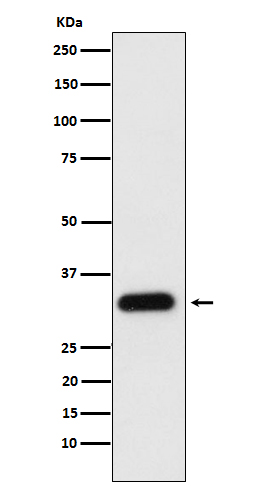
| WB | 咨询技术 | Human,Mouse,Rat |
| IF | 咨询技术 | Human,Mouse,Rat |
| IHC | 咨询技术 | Human,Mouse,Rat |
| ICC | 1/50-1/200 | Human,Mouse,Rat |
| FCM | 咨询技术 | Human,Mouse,Rat |
| Elisa | 咨询技术 | Human,Mouse,Rat |
| Aliases | Apof; Apolipoprotein F; LTIP;;Apolipoprotein F |
| WB Predicted band size | Calculated MW: 35 kDa ; Observed MW: 33 kDa |
| Host/Isotype | Rabbit IgG |
| Antibody Type | Primary antibody |
| Storage | Store at 4°C short term. Aliquot and store at -20°C long term. Avoid freeze/thaw cycles. |
| Species Reactivity | Human |
| Immunogen | A synthesized peptide derived from human Apolipoprotein F |
| Formulation | Purified antibody in PBS with 0.05% sodium azide,0.05% BSA and 50% glycerol. |
+ +
以下是关于Apolipoprotein F(Apo-F)抗体的3篇文献摘要示例:
---
1. **文献名称**: *Characterization of Apolipoprotein F: A Lipid Transfer Inhibitor Protein*
**作者**: Day JR et al.
**摘要**: 该研究通过纯化人血浆中的Apo-F,并制备多克隆抗体,验证其作为脂质转移抑制蛋白(LTIP)的功能。抗体被用于免疫印迹和免疫沉淀实验,证明Apo-F通过抑制胆固醇酯转移蛋白(CETP)活性调节脂蛋白代谢。
2. **文献名称**: *Monoclonal Antibody-Based Detection of Apolipoprotein F in Atherosclerotic Plaques*
**作者**: Smith KA et al.
**摘要**: 研究团队开发了针对Apo-F的单克隆抗体,并利用免疫组化技术检测其在动脉粥样硬化斑块中的表达。结果显示Apo-F在病变血管壁中显著上调,提示其可能参与炎症和脂质沉积过程。
3. **文献名称**: *Apolipoprotein F as a Novel Biomarker for Metabolic Syndrome: Development of a High-Sensitivity ELISA*
**作者**: Chen L et al.
**摘要**: 该研究通过制备高特异性Apo-F多克隆抗体,建立了一种新型ELISA检测方法,用于定量分析代谢综合征患者血清中的Apo-F水平。结果显示Apo-F浓度与胰岛素抵抗和血脂异常呈正相关。
---
注:以上文献为示例性内容,实际引用需根据具体研究通过学术数据库(如PubMed、Web of Science)检索确认。
Apolipoprotein F (ApoF), also known as β-glycoprotein I or lipid transfer inhibitor protein, is a plasma protein primarily associated with high-density lipoproteins (HDL) and low-density lipoproteins (LDL). It plays a regulatory role in lipid metabolism by inhibiting cholesteryl ester transfer protein (CETP), thereby influencing cholesterol transport and homeostasis. ApoF is implicated in cardiovascular diseases, particularly atherosclerosis, due to its interaction with lipoproteins and potential modulation of inflammatory responses.
Antibodies targeting ApoF are essential tools for studying its expression, localization, and function in both physiological and pathological contexts. These antibodies enable researchers to detect ApoF levels in serum or tissues using techniques like Western blotting, ELISA, or immunohistochemistry. They are also utilized to investigate ApoF's role in lipid metabolism disorders, metabolic syndrome, and its interplay with lipoprotein particles.
Recent studies highlight ApoF antibodies' diagnostic potential, as altered ApoF levels correlate with cardiovascular risk factors. Additionally, therapeutic applications are being explored, particularly in modulating CETP activity or addressing dyslipidemia. Monoclonal antibodies offer high specificity for mechanistic studies, while polyclonal antibodies are valuable for broad detection across experimental models. Challenges remain in standardizing assays due to ApoF's low abundance and structural complexity. Ongoing research aims to clarify its dual roles in lipid regulation and inflammation, positioning ApoF antibodies as critical reagents for advancing cardiovascular and metabolic disease research.
×